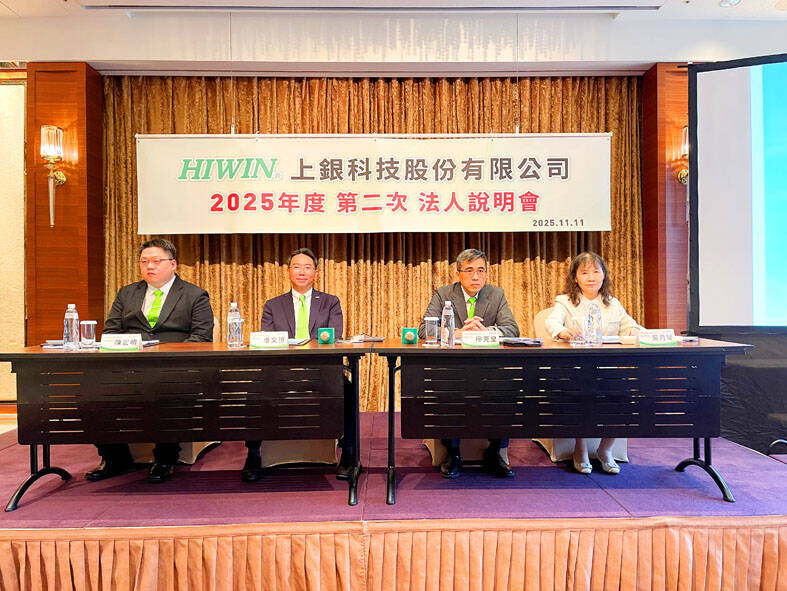Machinery maker Hiwin Technologies Co (上銀科技) yesterday reported net profit in the third quarter surged 230 percent to NT$446 million (US$14.36 million) from three months earlier, thanks to the contribution of foreign exchange gains.
The company — which supplies linear guideways, ball screws, bearings and industrial robots — booked NT$218 million in foreign exchange gains, reversing losses of NT$490 million in the second quarter, it said in an earnings report.
On an annual basis, net profit fell 33 percent, and earnings per share fell to NT$1.26 from NT$1.88, it said.

Photo: CNA
Revenue last quarter was the highest in three quarters at NT$5.995 billion, with linear guideways accounting for 63 percent, followed by ball screws at 20 percent, robots at 7 percent, and bearings and other items at 9 percent.
In the first three quarters, net profit decreased 35.2 percent year-on-year to NT$1.06 billion, and earnings per share declined to NT$3.01 from NT$4.64, while total revenue fell 1.4 percent to NT$17.76 billion, it added.
At an earnings conference in Taipei, Hiwin chairman Chuo Wen-heng (卓文恒) said the company expects increasing orders for semiconductor-related machinery equipment next year, as the semiconductor industry is still in its upcycle, the Chinese-language Liberty Times (the Taipei Times’ sister paper) reported.
Hiwin has been accelerating shipments of subsystem products, such as wafer robots, equipment front end module systems and robotic arms, to offset the impact of general demand weakness in the machinery industry.
The company expects robot revenue to account for 9 to 10 percent for the whole year and above 10 percent next year, Chuo said, adding that is because Hiwin targets to start shipments of logistics-specific robotic arms in small batches next year.
Humanoid robot components such as planetary roller screws are also expected to be launched next year, he added.
Chuo said he is optimistic that specialized artificial intelligence robots for logistics and agriculture segments would see stable development in the next two to three years.
Due to the impact of the US’ “retaliatory” tariffs, the business outlook would not become clearer until after March next year, he said.
While customers continue to place orders with Hiwin, they no longer place orders for as long as six months or a year at once as they used to, but only place orders when there is need, he said, adding that the company’s order visibility is about two and a half months or less.

PERSISTENT RUMORS: Nvidia’s CEO said the firm is not in talks to sell AI chips to China, but he would welcome a change in US policy barring the activity Nvidia Corp CEO Jensen Huang (黃仁勳) said his company is not in discussions to sell its Blackwell artificial intelligence (AI) chips to Chinese firms, waving off speculation it is trying to engineer a return to the world’s largest semiconductor market. Huang, who arrived in Taiwan yesterday ahead of meetings with longtime partner Taiwan Semiconductor Manufacturing Co (TSMC, 台積電), took the opportunity to clarify recent comments about the US-China AI race. The Nvidia head caused a stir in an interview this week with the Financial Times, in which he was quoted as saying “China will win” the AI race. Huang yesterday said

Nissan Motor Co has agreed to sell its global headquarters in Yokohama for ¥97 billion (US$630 million) to a group sponsored by Taiwanese autoparts maker Minth Group (敏實集團), as the struggling automaker seeks to shore up its financial position. The acquisition is led by a special purchase company managed by KJR Management Ltd, a Japanese real-estate unit of private equity giant KKR & Co, people familiar with the matter said. KJR said it would act as asset manager together with Mizuho Real Estate Management Co. Nissan is undergoing a broad cost-cutting campaign by eliminating jobs and shuttering plants as it grapples

The Chinese government has issued guidance requiring new data center projects that have received any state funds to only use domestically made artificial intelligence (AI) chips, two sources familiar with the matter told Reuters. In recent weeks, Chinese regulatory authorities have ordered such data centers that are less than 30 percent complete to remove all installed foreign chips, or cancel plans to purchase them, while projects in a more advanced stage would be decided on a case-by-case basis, the sources said. The move could represent one of China’s most aggressive steps yet to eliminate foreign technology from its critical infrastructure amid a

MORE WEIGHT: The national weighting was raised in one index while holding steady in two others, while several companies rose or fell in prominence MSCI Inc, a global index provider, has raised Taiwan’s weighting in one of its major indices and left the country’s weighting unchanged in two other indices after a regular index review. In a statement released on Thursday, MSCI said it has upgraded Taiwan’s weighting in the MSCI All-Country World Index by 0.02 percentage points to 2.25 percent, while maintaining the weighting in the MSCI Emerging Markets Index, the most closely watched by foreign institutional investors, at 20.46 percent. Additionally, the index provider has left Taiwan’s weighting in the MSCI All-Country Asia ex-Japan Index unchanged at 23.15 percent. The latest index adjustments are to